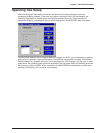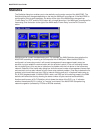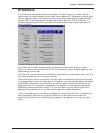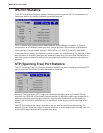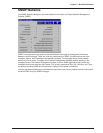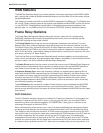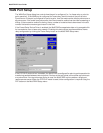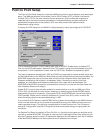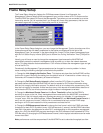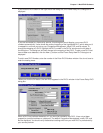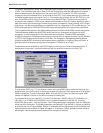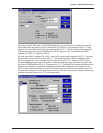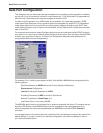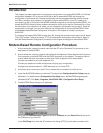
41
Chapter 4 - MultiFRAD Software
Point to Point Setup
The Point to Point Setup dialog box controls the WAN port protocol, dial on demand, and remote port
setup. The WAN port protocol can be either Point to Point Protocol (PPP) or Serial Line Internet
Protocol (SLIP). PPP is the more robust of the two protocols in that it enables the endpoints to
negotiate use of the link and protocol parameters in a standardized way and also provides for
standardized encapsulation of the packets. SLIP is an older protocol that requires manual
authentication using a script.
To display the PPP dialog box, the WAN Port Setup dialog box has to be configured for PPP/SLIP.
PPP is the default protocol. If SLIP is being used, click on the PPP Enable option to disable PPP.
Click on the SLIP Enable option. Determine if the TCP header is going to be compressed using VJC
compression. If VJC compression is used, click the CSLIP (Van Jacobson Compression) option.
Two types of password authentication (PAP and CHAP) are supported for remote access clients and
can be enabled here on the WAN tab. When either (or both) authentication protocols are enabled, the
MultiFRAD expects the client at the other side of the link to be configured with a User Name and
Password combination that is listed in its database. (Note: if there are no entries in the User
database, any User Name and Password combination from a peer will be authenticated. For
MultiFRAD-to-MultiFRAD connections, authentication normally is not used and the User Name and
User Password fields are left empty.)
Enable SLIP if you are using this older protocol for communication on a dial-out WAN port. Either
PPP or SLIP can be used on a dial-out port; however, on answering ports the MultiFRAD detects
automatically the type of connection. If you enable CSLIP, the MultiFRAD will transmit and receive
CSLIP packets. Packet size is limited by the Maximum Transmit Unit (MTU) value, for which the
maximum setting (also the recommended setting) is 1006.
If you enable Dial On Demand, the MultiFRAD will bring down the connection on the WAN link when
there is no real data traffic on the line and will automatically bring up the WAN link when there is a
need to get data across. (This option is not applicable for a direct-connect link.) The 180-second
setting for “Hangup After” sets the DTR signal low three minutes after hangup, bringing down the
connection.
For Remote Port Setup, the default is Client Or LAN; i.e., the point-to-point peer can be either a dial-
up client or another MultiFRAD. If the peer is a dial-up client, enabling the Client Only option lets you
save on IP address since the client’s IP address will belong to the LAN network; also, the IP address
of the MultiFRAD’s WAN port will be the same as the IP address of its LAN port.



